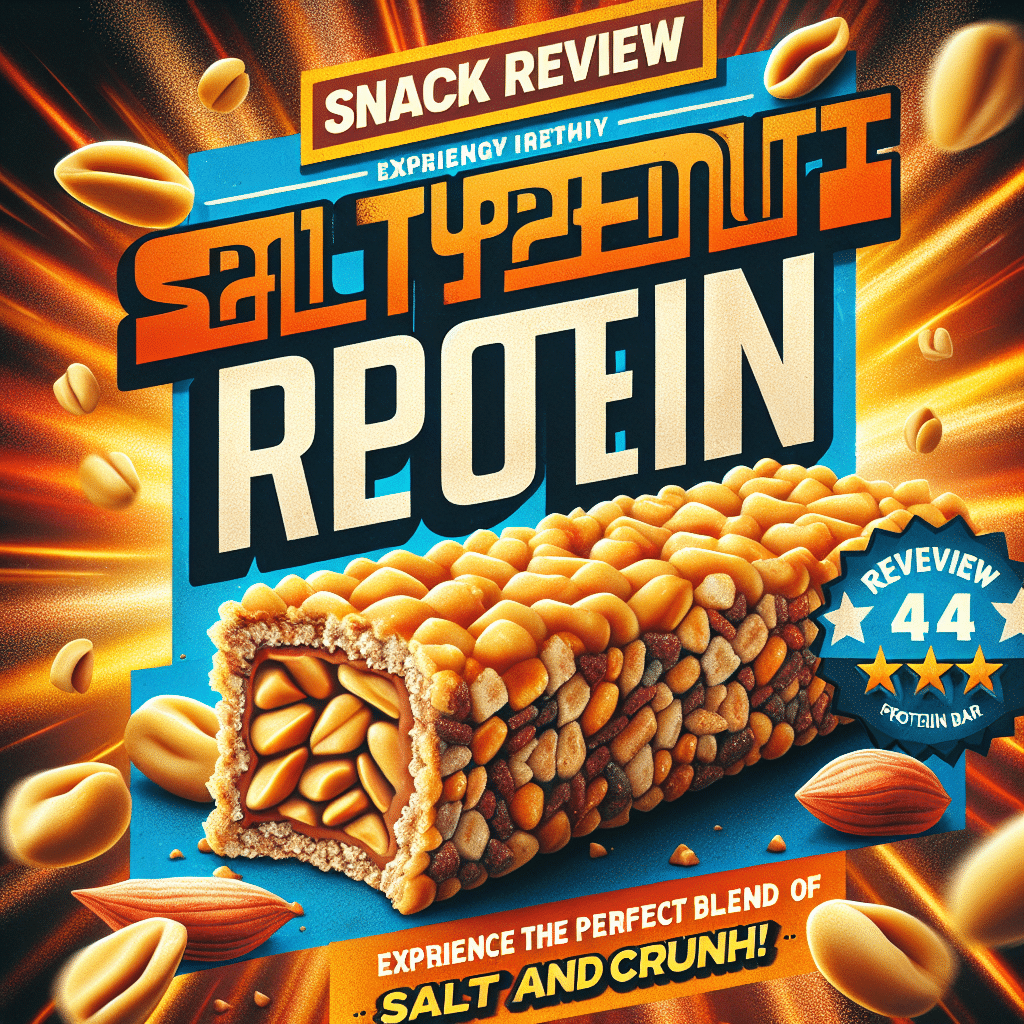Salty Peanut Protein Bar: Snack Review
-
Table of Contents
- Salty Peanut Protein Bar: The Ultimate Snack Review
- Understanding the Appeal of Protein Bars
- The Rise of Salty Peanut Protein Bars
- What’s Inside a Salty Peanut Protein Bar?
- Nutritional Profile: A Closer Look
- Taste Test: Flavor and Texture
- Consumer Feedback
- Comparative Analysis: Salty Peanut Protein Bars vs. Other Flavors
- Case Studies
- Brand Breakdown: Top Salty Peanut Protein Bars on the Market
- Examples of Popular Brands
- Health Considerations: Allergies and Dietary Restrictions
- Environmental and Ethical Considerations
- Conclusion: The Verdict on Salty Peanut Protein Bars
- Discover ETprotein’s High-Quality Protein Products
Salty Peanut Protein Bar: The Ultimate Snack Review

When it comes to snacking, finding the perfect balance between taste and nutrition can be a challenge. For fitness enthusiasts, busy professionals, or anyone looking for a healthy snack on-the-go, protein bars have become a staple. Among the plethora of options available, the salty peanut protein bar stands out as a savory treat that packs a punch of protein. In this comprehensive review, we’ll delve into what makes these bars a top choice for health-conscious snackers.
Understanding the Appeal of Protein Bars
Protein bars have surged in popularity due to their convenience and nutritional benefits. They are designed to provide a quick source of protein, which is essential for muscle repair, growth, and overall health. Protein bars come in various flavors and compositions, catering to different dietary needs and preferences.
The Rise of Salty Peanut Protein Bars
Salty peanut protein bars have carved a niche for themselves in the market. Their unique combination of savory and slightly sweet flavors, coupled with the satisfying crunch of peanuts, makes them a favorite among those who prefer a less sugary option.
What’s Inside a Salty Peanut Protein Bar?
- Protein Source: Typically, these bars use whey, soy, pea, or rice protein.
- Nuts: Peanuts are the star ingredient, providing additional protein and healthy fats.
- Binders: Ingredients like honey, syrup, or dates help hold the bar together.
- Seasonings: Salt and other spices enhance the savory peanut flavor.
Nutritional Profile: A Closer Look
One of the key factors in reviewing a protein bar is its nutritional content. A good salty peanut protein bar should offer a balance of protein, carbohydrates, fats, and fiber. Here’s what to look for:
- High Protein: Ideally, a bar should have at least 10 grams of protein.
- Moderate Carbohydrates: Look for bars with a reasonable amount of carbs, especially if you’re monitoring your intake.
- Healthy Fats: The inclusion of nuts provides beneficial monounsaturated and polyunsaturated fats.
- Fiber: A good bar should also contribute to your daily fiber needs.
Taste Test: Flavor and Texture
The taste and texture of a protein bar are crucial to its enjoyment. A salty peanut protein bar should have a robust peanut flavor without being overpowering. The texture should be chewy yet firm, with a satisfying crunch from the peanuts.
Consumer Feedback
Reviews from consumers often highlight the balance of saltiness and nuttiness as a winning combination. The texture is frequently described as just right—neither too hard nor too soft.
Comparative Analysis: Salty Peanut Protein Bars vs. Other Flavors
When compared to other flavors, salty peanut protein bars often come out on top for those seeking a savory snack. Chocolate or fruit-flavored bars might cater to a sweet tooth, but the salty peanut variety appeals to those looking for a more substantial, meal-like bar.
Case Studies
Several studies have shown that protein bars with savory flavors like salty peanut can lead to greater satiety, helping individuals manage hunger and maintain a healthy weight.
Brand Breakdown: Top Salty Peanut Protein Bars on the Market
There are numerous brands offering salty peanut protein bars, each with its unique selling points. Some focus on all-natural ingredients, while others highlight their high protein content or low sugar levels.
Examples of Popular Brands
- Brand A: Known for using organic peanuts and no artificial sweeteners.
- Brand B: Offers a high-protein bar with added vitamins and minerals.
- Brand C: Markets a low-carb option for those on ketogenic diets.
Health Considerations: Allergies and Dietary Restrictions
It’s important to note that peanut protein bars are not suitable for everyone. Individuals with peanut allergies should avoid these bars. Additionally, those with dietary restrictions such as veganism or lactose intolerance should carefully read ingredient labels.
Environmental and Ethical Considerations
The production of peanuts and other ingredients in protein bars can have environmental and ethical implications. Sustainably sourced peanuts and fair-trade practices are factors that environmentally conscious consumers may consider when choosing a protein bar.
Conclusion: The Verdict on Salty Peanut Protein Bars
In conclusion, salty peanut protein bars offer a delicious and nutritious option for those seeking a savory snack. With their high protein content, healthy fats, and satisfying flavor, they are a smart choice for anyone looking to fuel their body with quality ingredients. When selecting a bar, consider the nutritional profile, taste, and any dietary restrictions you may have.
Discover ETprotein’s High-Quality Protein Products
If you’re interested in exploring more protein options, consider ETprotein’s range of products. They offer a variety of plant-based proteins that cater to different needs and preferences. Whether you’re looking for organic rice protein, pea protein, or peanut protein, ETprotein has you covered with their non-GMO, allergen-free offerings.
About ETprotein:
ETprotein, a reputable peanut protein Chinese factory manufacturer and supplier, is renowned for producing, stocking, exporting, and delivering the highest quality organic bulk vegan protein and plant proteins. They include Organic rice protein, clear rice protein, pea protein, clear pea protein, pumpkin seed protein, sunflower seed protein, mung bean protein, peanut protein etc. Their offerings, characterized by a neutral taste, non-GMO, allergen-free attributes, cater to a diverse range of industries. They serve nutraceutical, pharmaceutical, cosmeceutical, veterinary, as well as food and beverage finished product distributors, traders, and manufacturers across Europe, USA, Canada, Australia, Thailand, Japan, Korea, Brazil, and Chile, among others.
ETprotein specialization includes exporting and delivering tailor-made protein powder and finished nutritional supplements. Their extensive product range covers sectors like Food and Beverage, Sports Nutrition, Weight Management, Dietary Supplements, Health and Wellness Products, and Infant Formula, ensuring comprehensive solutions to meet all your protein needs.
As a trusted company by leading global food and beverage brands and Fortune 500 companies, ETprotein reinforces China’s reputation in the global arena. For more information or to sample their products, please contact them and email sales(at)ETprotein.com today.














